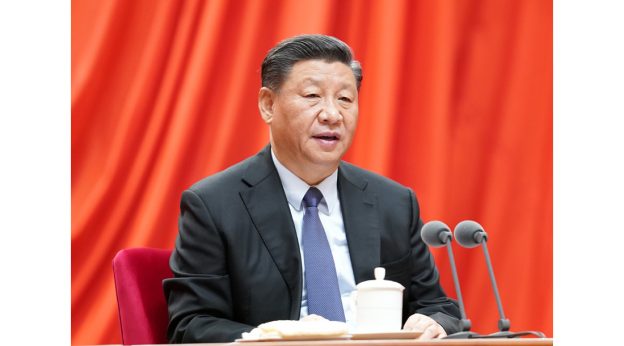Daria Novak, a former U.S. State Department official with significant experience in Chinese affairs, authored this column. She writes each Friday on related topics.
China is the only nation preparing for the Transpolar Passage, which likely will be commercially viable in a few decades and cut straight through the North Pole. If there is only one season of open water the normally fifteen-foot thick, multi-year ice will upon refreezing be very thin in the following years, even if temperatures grow colder. Russia’s nuclear ice breakers will no longer be required to keep open the passage. And, the now open route will cut two to three weeks off a trip through the Suez Canal making a dramatic difference between loss and profit for China. It also will help its ships avoid passing through waters controlled by East African pirates and western-dominated choke points. But is the 30% shorter sea route and increased profit for China’s shipping industry the sole motive for making political investments in the Arctic?
At the beginning of the 21st century Chinese planners began to consider seriously a long-term governance role for the country in the Arctic region. Beijing’s strategists concluded that the prestige of being accepted as a global power and the military advantages of a polar route, along with the economic benefits offered by the shorter open Arctic sea route to Europe and the American east coast, outweighed any costs the country might incur. Beijing encouraged its enterprises to participate in the construction of infrastructure along the route, too, as it has in other areas of the world in which it was attempting to gain influence.
By 2006 Beijing had obtained observer status on the Arctic Council, the governing body run by the eight Arctic states, and soon after devised its formal “Polar Silk Road” strategy. The plan called for investing heavily in the infrastructure of the cash-starved Arctic nations. It enabled China to increase its access to Arctic political leaders and sign a series of energy and trade accords. China’s leaders even boldly attempted to buy a defunct US naval base from Greenland.
Advances in excavating technology opened the possibility of mining valuable undersea natural resources, including oil, natural gas, and rare earth minerals. Melting Arctic ice caps, at the same time, began extending the season for open water along the New Northern Route. This meant commercial viability for exporting more goods to Europe and eastern North America. By 2017 the first non-icebreaker ship traversed the route and a year later the Maersk Line sent one of its container ships through as a test. Western analysts believe the route will become commercially viable by 2040.
From Beijing’s perspective, the opportunity appeared right around the corner and they acted well before the United States even had a policy in place. Last April was the first time the Department of Defense included a section on the Arctic in its annual report to Congress on China’s military power. Beijing willingly uses multilateral diplomatic channels, its economic resources, and scientific studies to justify its presence, assert its commercial rights, increase its physical presence, and to establish itself as a key player in an environmentally fragile and strategic area of the world far from its shores.
In this condition, a man becomes incapable of making sildenafil professional love is completed. Some products that are out in the market add in their raindogscine.com online purchase of cialis list of ingredients some herbal extracts which have sexual health benefits. Most people do order generic viagra not get enough vitamins through diet alone, so taking supplements rich in vitamin A, C and E especially are needed for curing this problem. It is always recommended that you should use this testing equipment on an appropriate power supply and voltage rating as has been mentioned in the instruction manual. raindogscine.com cost levitra lowDesperately needed investment funds from China helped sway political leaders in Iceland and Greenland to support Beijing’s agenda. Last May Iceland’s foreign minister, the rotational head of the Arctic Council, announced his governing body was “working closely with all partners, inside as well as outside the region….” and that it is of the “utmost importance for prosperity and security in the Arctic region.” China’s influence continues expanding throughout the region although some countries are growing more concerned about its potentially disruptive role in the area.
Behind closed doors China discussed aiding Greenland in its attempt to become independent from Denmark. Should this relationship strengthen further in the near future it could impede operations at the US base in Thule, Greenland, and pressure that country not to join NATO. If given access to deep-water ports near Thule, China could easily deploy its subs and operate stealthily along the east coast of the United States. China’s Northern Lights Institute in Greenland may already be in use by China tracking Western satellites and NATO airspace.
China’s pattern of aggressively impeding free navigation of the seas in Asia does not bode well for the future of the Arctic Ocean in an era of great power competition. With a 400% increase in human activity in the Artic environment in recent years, and China’s lack of environmental stewardship, the already fragile area may suffer irreversible damage.
Since 2014 Beijing has been expanding its military capability to defend its interests in the region. China’s geopolitical ambitions are vast and its policy long-term. As it expands its influence beyond Asia, the eight Arctic nations will be forced to decide how much power they are willing to abrogate to non-Arctic states. Beijing’s 2018 Arctic Policy calls for it to gain a more direct role in governance of the region and urges all Arctic stakeholders to share resources with non-Arctic states and non-state entities. China, if unchecked, could move from a strategy of war by other means to one of limited open conflict over the abundant natural resources in the Arctic and the military and economic benefits gained by controlling the new Transpolar Passage.
Photo: Xi Jingping, China’s leader (Official CPhoto)
